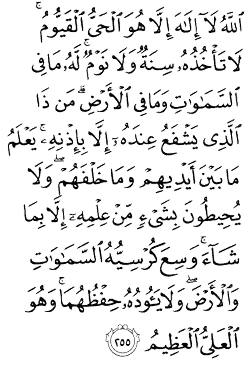Living The Quran
From Issue: 933 [Read full issue]
The Divine
Al-Baqara (The Cow) - Chapter 2: Verse 255
 "God. There is no God but He, the Living, the Everlasting. Neither slumber seizes Him nor sleep. To Him belongs all that is in the heavens and on earth. Who is there shall intercede with Him, save by His leave? He knows all that lies before them and what is after them. Nor can they grasp aught of His knowledge, except as He wills. His Throne extends over the heavens and the earth, and upholding them wearies Him not. He is the Most High, the Sublime."
"God. There is no God but He, the Living, the Everlasting. Neither slumber seizes Him nor sleep. To Him belongs all that is in the heavens and on earth. Who is there shall intercede with Him, save by His leave? He knows all that lies before them and what is after them. Nor can they grasp aught of His knowledge, except as He wills. His Throne extends over the heavens and the earth, and upholding them wearies Him not. He is the Most High, the Sublime."
This passage is the heart and soul of the Quran. It begins with the verse that is second only to al-Fatiha in familiarity to Muslims. Known as Ayat al Kursi, the Throne verse, it was considered by classical commentators to be the most excellent verse in the Quran. It is a popular subject for calligraphy, and in a great diversity of calligraphic forms finds a place on display in millions of Muslim homes around the world.
Ayat al Kursi is the most beautiful statement of the power and majesty of the Almighty. It reveals God as the creative and sustaining force behind all existence, the Divine who is all-knowing and always aware, a ceaseless, unwearying presence conscious of each individual in all their activities: what we show as well as what we conceal, what has happened to us and what awaits us. Such power and majesty can only be made evident to human beings by God alone. It is only by God's will that we can come to know the Divine that is far beyond human consciousness or capability.
Knowledge is a crucial aspect of the Divine. And the emphasis throughout the Quran on God's knowledge is reflected again and again in the impetus this gives to the exercise of human intellect to understand and appreciate better both God's creation and the meaning and operation of God's guidance to humankind. The use of reason is essential to making the right decisions, making the right qualitative judgements on how to act in this world and how to distinguish right from wrong. The word Kursi means throne, but in Muslim thought and parlance it has become inseparable from the concept of knowledge. Knowledgeable and learned people are referred to as 'People of the Chair', and this is the origin of the professorial 'chair'. Many of the terms we associate with universities derive from Arabic, a legacy of the institution's origin in Muslim civilisation, from which it was borrowed wholesale by European society during the Middle Ages.
Compiled From:
"Reading the Qur'an: The Contemporary Relevance of the Sacred Text of Islam" - Ziauddin Sardar, pp. 179-180